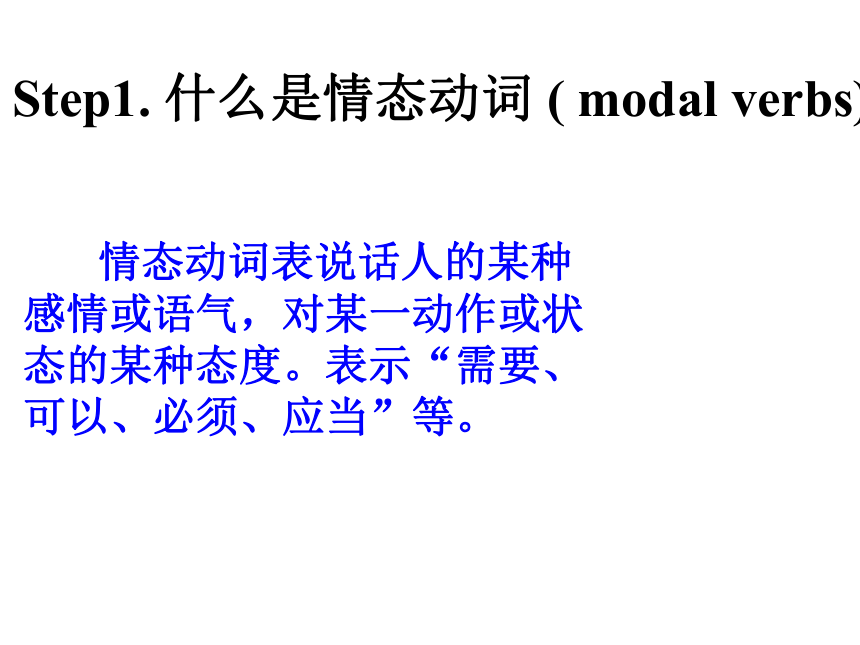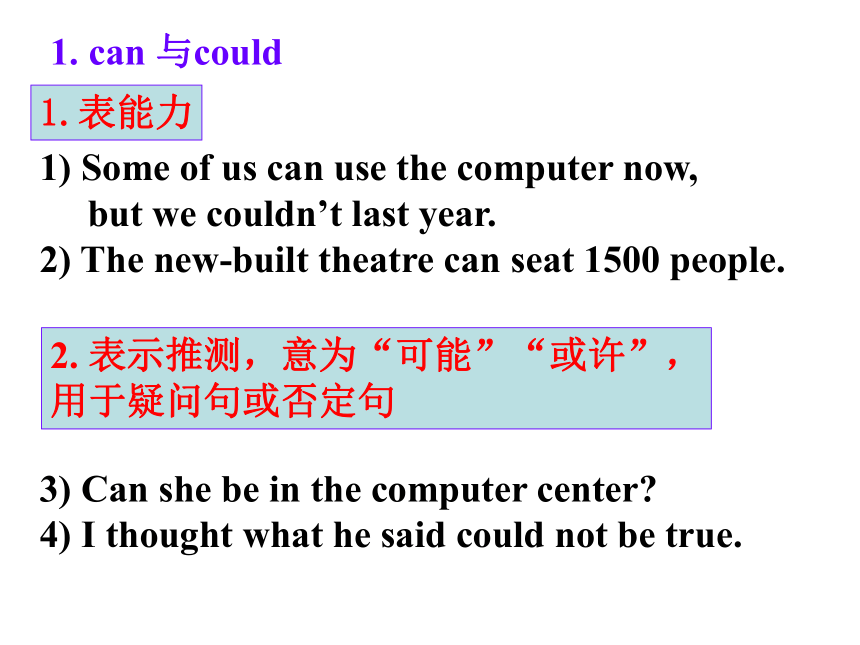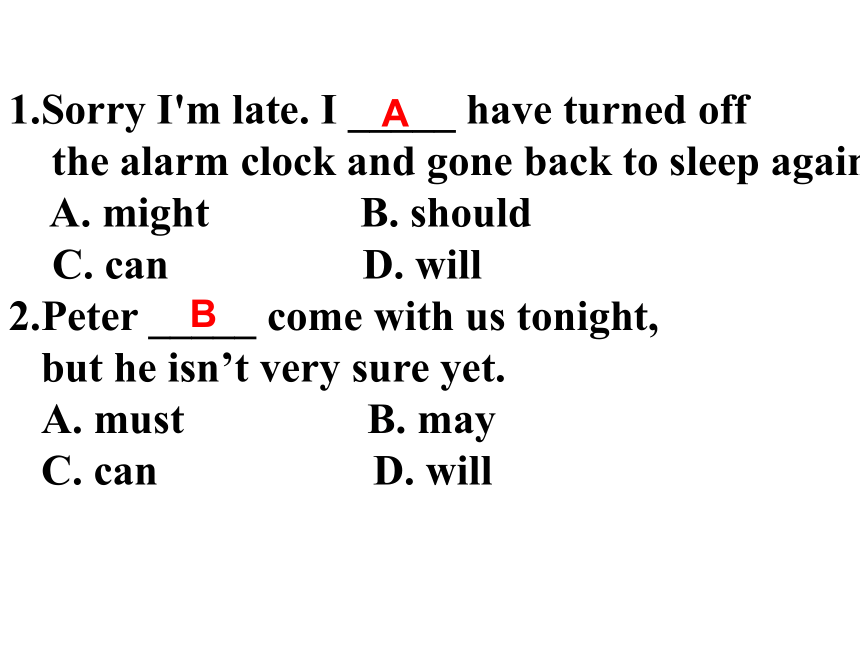2022届高三英语二轮复习:情态动词课件-(31张ppt)
文档属性
| 名称 | 2022届高三英语二轮复习:情态动词课件-(31张ppt) |  | |
| 格式 | pptx | ||
| 文件大小 | 303.9KB | ||
| 资源类型 | 教案 | ||
| 版本资源 | 通用版 | ||
| 科目 | 英语 | ||
| 更新时间 | 2022-01-18 15:15:09 | ||
图片预览












文档简介
(共31张PPT)
情态动词
Modal verbs
情态动词表说话人的某种
感情或语气,对某一动作或状
态的某种态度。表示“需要、
可以、必须、应当”等。
Step1. 什么是情态动词 ( modal verbs)
can (could)
may(might)
shall(should)
will (would)
must(must)
dare (dared)
need (need)
have to
ought to
be able to
used to
Step2. 常用的情态动词
1) Some of us can use the computer now,
but we couldn’t last year.
2) The new-built theatre can seat 1500 people.
3) Can she be in the computer center
4) I thought what he said could not be true.
1.表能力
2. 表示推测,意为“可能”“或许”,
用于疑问句或否定句
1. can 与could
4. 表示“许可”,可与may 换用。
7)You can go home now.
5. can 用于疑问句或否定句中时,表惊异、
不相信等,意思是“可能、能够”。
8)How can you say that you really understand the whole story if you have covered only part of the article
5) Can/Could I use your dictionary
6) Could you lend me a hand
3. 表示“请求” “允许”(表请求时,口语中常用
could 代替 can 使语气更委婉,回答时用can)
Michael ____ be a policeman, for he’s much too short.
A. needn’t B. can’t C. should D. may
2. Mr. Bush is on time for everything. How ____ it be
that he was late for the opening ceremony
A. can B. should C. may D. must
B
A
2. may 与might
1. 表示“许可”或“请求”,有“可以”的意思,口语中
常用 might 代 may ,表示委婉语气。
否定回答时用“must not”表“禁止,阻止”,
不用 “may not”. “may not” 表示“可能不” 。
Eg: --- May I watch TV after supper
--- Yes, you may. / No, you mustn’t.
2. 表示可能性。 意为“或许,可能” might 比 may 可能性小。
Eg: 1) It might be true.
2) They may be in the library now.
3. May you +动词原形 表“希望、祝愿、祈求”
“祝你……”
Eg: May you success.
1.Sorry I'm late. I _____ have turned off
the alarm clock and gone back to sleep again.
A. might B. should
C. can D. will
2.Peter _____ come with us tonight,
but he isn’t very sure yet.
A. must B. may
C. can D. will
A
B
3. will 与would
1. 表“请求、建议”等,用 would 比用will 委婉,客气些
Eg: 1)Will you lend me your book
2) Would you like a cup of tea
2. 用于表示意志或意愿。 will 指现在,
而 would 指 过去。
Eg: 1) I’ll never do that again.
2) They said that they would help us.
3.表示习惯性动作。 译作 “总是、惯于” will 指现在,
would 指过去。
Eg: 1)He will often read all night.
2) Fish will die without water.
3) Every evening, she would sit by window,
deep in thought.
4. 表示功能,译作“能、行”
Eg: 1) That will be all right.
2) This door won’t open.
5. 用于否定句中,表示“不肯、不乐意”
Eg: No matter what I said, he won’t listen to me.
4. should
1. 用于表劝告、建议。 意为”应该、应当”。
Eg: You should keep your promise.
2. 用于表推测。 意为 “可能、该…”
Eg: 1) It’s 7 o’clock, he should be at home.
2) They should have arrived by now.
5. shall 与will
1. Shall 与第一、三人称连用,且用在疑问句中时,
表说话人征求听话者的允诺。
Will 与第二人称连用,且出现在疑问句中时,
表示请求。 Would 更客气。
Eg: 1) Shall we begin our discussion
2) Shall the driver wait
3) Will you speak louder, please
2. shall的主语是第二、三人称的陈述句,表示说话人的允诺、警告、命令等语气。
will 的主语是第一、二、三人称的陈述句,
表意志、意愿。
Eg: 1)You shall get the book tomorrow.
2) He shall be punished.
3) You shall go with me.
4) If you come to my house,
I will show you my new painting.
允诺
警告
命令
6. can’t
用来表示由于特定事实或环境某事肯定不会发生。
Eg: 1) ---Listen, someone is knocking at the door,
who can it be
--- It can’t be Tom, he has gone abroad.
2) --- Can/ could they have finished the work
--- No, they can’t have finished the work so soon.
7. must
1. 表示义务或强烈的劝告,意为“必须”“应该”,其否定式表示“不应该”“不许可” “不准”“禁止”。
Eg: 1) You must finish your homework first.
2) Children mustn’t speak like that to their parents.
2. 回答 must 所在的一般疑问句时,否定回答用
“needn’t” “don’t have to”.
Eg: ---Must we finish the work tomorrow
---No, you needn’t/ don’t have to, but you must finish it in three days.
3. 表推测,用于肯定句,意为“一定”“务必”。
Eg: 1) Betty must be in the next room.
2) He must be watering the flowers in his garden.
特别注意:
情态动词+have +done的用法
1. must + have done,表对过去肯定的推测。
情态动词+have + P.P.
Eg: The ground was so wet. It must have rained last night.
---- We didn't see Tom at the meeting yesterday.
---- He can’t ___________ (attend) it.
2. can’t/couldn’t+have done表示对过去否定猜测
have attended
3. may(might)+ have done, 表示对过去事情的猜测, 认为某事“可能”发生.
Eg: He may (might) have played electric game
on TV the whole night, for he looks very
sleepy.
4.could+have done
表示本来能做得到, 但事实上未做到
1.He could have finished the task on time, but the heavy snow_____ (come).
2.He didn’t come back last night . What could ______________(happen) to him.
came
have happened
5. should/ ought to + have done. 过去本该做,而事实上却没有做
The plant is dead. I should have given it more water.
You should not have left your baby alone in the house.
6. needn’t + have done.表示
本来不必做,但做了.
She need not have attend the meeting yesterday, but she did.
她昨天本不必参加会议,可她参加了.
灵活运用
1. I _______worry about my weekend—I always have my plans ready before it comes.
意为“不必”。句意为:我不必担心我的周末——我总是没等到周末就把计划安排好了。
needn’t
2. Just be patient. You ______expect the world to change so soon.
表示能力,can’t不能。
3. —May I take this book out of the reading room?
—No,you ________.You read it in here.
表示禁止,“一定不,不准许”。
can’t
mustn’t
4. You _______park here! It’s an emergency exit.
由It’s an emergency exit可知, “不准”在此停车。
5. I can’t leave. She told me that I ______ stay here until she comes back.
表示“必须”,句意为:我不能离开,她告诉我必须在这等到她回来。
mustn’t
must
6. — I don’t really like James. Why did you invite him?
— Don’t worry. He ___________not come. He said he wasn’t certain what his plans were.
在此表推测,意为“可能”,否定式may/ might not的意思是“可能不”。
may/might
7. It _____have been Tom that parked the car here, as he is the only one with a car.
由as he is the only one with a car可知,“一定是”Tom了。
8. The traffic is heavy this day; I ______ arrive a bit late, so could you save me a place?
表“可能”“也许”。句意为:这几天道路很堵,我可能会迟到一会儿,你能帮我留个座位吗?
must
might
9. It is usually warm in my hometown in March,but it _____be rather cold sometimes.
表示“有时会”。
10. She _____ have left school, for her bike is still here.
表示“不可能已经离开学校了”。
can
can’t
Thank you!
情态动词
Modal verbs
情态动词表说话人的某种
感情或语气,对某一动作或状
态的某种态度。表示“需要、
可以、必须、应当”等。
Step1. 什么是情态动词 ( modal verbs)
can (could)
may(might)
shall(should)
will (would)
must(must)
dare (dared)
need (need)
have to
ought to
be able to
used to
Step2. 常用的情态动词
1) Some of us can use the computer now,
but we couldn’t last year.
2) The new-built theatre can seat 1500 people.
3) Can she be in the computer center
4) I thought what he said could not be true.
1.表能力
2. 表示推测,意为“可能”“或许”,
用于疑问句或否定句
1. can 与could
4. 表示“许可”,可与may 换用。
7)You can go home now.
5. can 用于疑问句或否定句中时,表惊异、
不相信等,意思是“可能、能够”。
8)How can you say that you really understand the whole story if you have covered only part of the article
5) Can/Could I use your dictionary
6) Could you lend me a hand
3. 表示“请求” “允许”(表请求时,口语中常用
could 代替 can 使语气更委婉,回答时用can)
Michael ____ be a policeman, for he’s much too short.
A. needn’t B. can’t C. should D. may
2. Mr. Bush is on time for everything. How ____ it be
that he was late for the opening ceremony
A. can B. should C. may D. must
B
A
2. may 与might
1. 表示“许可”或“请求”,有“可以”的意思,口语中
常用 might 代 may ,表示委婉语气。
否定回答时用“must not”表“禁止,阻止”,
不用 “may not”. “may not” 表示“可能不” 。
Eg: --- May I watch TV after supper
--- Yes, you may. / No, you mustn’t.
2. 表示可能性。 意为“或许,可能” might 比 may 可能性小。
Eg: 1) It might be true.
2) They may be in the library now.
3. May you +动词原形 表“希望、祝愿、祈求”
“祝你……”
Eg: May you success.
1.Sorry I'm late. I _____ have turned off
the alarm clock and gone back to sleep again.
A. might B. should
C. can D. will
2.Peter _____ come with us tonight,
but he isn’t very sure yet.
A. must B. may
C. can D. will
A
B
3. will 与would
1. 表“请求、建议”等,用 would 比用will 委婉,客气些
Eg: 1)Will you lend me your book
2) Would you like a cup of tea
2. 用于表示意志或意愿。 will 指现在,
而 would 指 过去。
Eg: 1) I’ll never do that again.
2) They said that they would help us.
3.表示习惯性动作。 译作 “总是、惯于” will 指现在,
would 指过去。
Eg: 1)He will often read all night.
2) Fish will die without water.
3) Every evening, she would sit by window,
deep in thought.
4. 表示功能,译作“能、行”
Eg: 1) That will be all right.
2) This door won’t open.
5. 用于否定句中,表示“不肯、不乐意”
Eg: No matter what I said, he won’t listen to me.
4. should
1. 用于表劝告、建议。 意为”应该、应当”。
Eg: You should keep your promise.
2. 用于表推测。 意为 “可能、该…”
Eg: 1) It’s 7 o’clock, he should be at home.
2) They should have arrived by now.
5. shall 与will
1. Shall 与第一、三人称连用,且用在疑问句中时,
表说话人征求听话者的允诺。
Will 与第二人称连用,且出现在疑问句中时,
表示请求。 Would 更客气。
Eg: 1) Shall we begin our discussion
2) Shall the driver wait
3) Will you speak louder, please
2. shall的主语是第二、三人称的陈述句,表示说话人的允诺、警告、命令等语气。
will 的主语是第一、二、三人称的陈述句,
表意志、意愿。
Eg: 1)You shall get the book tomorrow.
2) He shall be punished.
3) You shall go with me.
4) If you come to my house,
I will show you my new painting.
允诺
警告
命令
6. can’t
用来表示由于特定事实或环境某事肯定不会发生。
Eg: 1) ---Listen, someone is knocking at the door,
who can it be
--- It can’t be Tom, he has gone abroad.
2) --- Can/ could they have finished the work
--- No, they can’t have finished the work so soon.
7. must
1. 表示义务或强烈的劝告,意为“必须”“应该”,其否定式表示“不应该”“不许可” “不准”“禁止”。
Eg: 1) You must finish your homework first.
2) Children mustn’t speak like that to their parents.
2. 回答 must 所在的一般疑问句时,否定回答用
“needn’t” “don’t have to”.
Eg: ---Must we finish the work tomorrow
---No, you needn’t/ don’t have to, but you must finish it in three days.
3. 表推测,用于肯定句,意为“一定”“务必”。
Eg: 1) Betty must be in the next room.
2) He must be watering the flowers in his garden.
特别注意:
情态动词+have +done的用法
1. must + have done,表对过去肯定的推测。
情态动词+have + P.P.
Eg: The ground was so wet. It must have rained last night.
---- We didn't see Tom at the meeting yesterday.
---- He can’t ___________ (attend) it.
2. can’t/couldn’t+have done表示对过去否定猜测
have attended
3. may(might)+ have done, 表示对过去事情的猜测, 认为某事“可能”发生.
Eg: He may (might) have played electric game
on TV the whole night, for he looks very
sleepy.
4.could+have done
表示本来能做得到, 但事实上未做到
1.He could have finished the task on time, but the heavy snow_____ (come).
2.He didn’t come back last night . What could ______________(happen) to him.
came
have happened
5. should/ ought to + have done. 过去本该做,而事实上却没有做
The plant is dead. I should have given it more water.
You should not have left your baby alone in the house.
6. needn’t + have done.表示
本来不必做,但做了.
She need not have attend the meeting yesterday, but she did.
她昨天本不必参加会议,可她参加了.
灵活运用
1. I _______worry about my weekend—I always have my plans ready before it comes.
意为“不必”。句意为:我不必担心我的周末——我总是没等到周末就把计划安排好了。
needn’t
2. Just be patient. You ______expect the world to change so soon.
表示能力,can’t不能。
3. —May I take this book out of the reading room?
—No,you ________.You read it in here.
表示禁止,“一定不,不准许”。
can’t
mustn’t
4. You _______park here! It’s an emergency exit.
由It’s an emergency exit可知, “不准”在此停车。
5. I can’t leave. She told me that I ______ stay here until she comes back.
表示“必须”,句意为:我不能离开,她告诉我必须在这等到她回来。
mustn’t
must
6. — I don’t really like James. Why did you invite him?
— Don’t worry. He ___________not come. He said he wasn’t certain what his plans were.
在此表推测,意为“可能”,否定式may/ might not的意思是“可能不”。
may/might
7. It _____have been Tom that parked the car here, as he is the only one with a car.
由as he is the only one with a car可知,“一定是”Tom了。
8. The traffic is heavy this day; I ______ arrive a bit late, so could you save me a place?
表“可能”“也许”。句意为:这几天道路很堵,我可能会迟到一会儿,你能帮我留个座位吗?
must
might
9. It is usually warm in my hometown in March,but it _____be rather cold sometimes.
表示“有时会”。
10. She _____ have left school, for her bike is still here.
表示“不可能已经离开学校了”。
can
can’t
Thank you!
